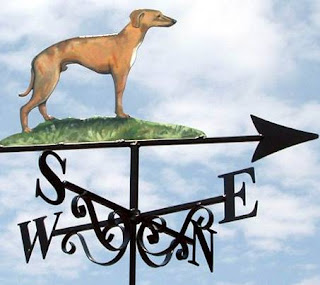genes for muscles or genes for running?
I read an online article today by Maggie Fox, a health and science editor at Reuters. The article is about a mutation in one breed of dogs that seems to enable the dog to run much faster. Here's an excerpt from the article:
 Oddly enough even though the mutation carries a huge advantage, only a third of the fastest Whippets carry that gene. The other dogs are fast for other reasons. And if the dog has a double mutation for this they develop too much muscle and are of no use to the breeder--and are usually destroyed. Further, other breeds of dogs don't have this mutation at all. At least not breeds examined so far. Research like this often raises as many questions as it answers.
Oddly enough even though the mutation carries a huge advantage, only a third of the fastest Whippets carry that gene. The other dogs are fast for other reasons. And if the dog has a double mutation for this they develop too much muscle and are of no use to the breeder--and are usually destroyed. Further, other breeds of dogs don't have this mutation at all. At least not breeds examined so far. Research like this often raises as many questions as it answers.
Along this canine theme, the researcher that found the mutation link above commented on how research with dogs can spark advances in cancer research. Cancer in humans as well as dogs. You can find the details at this link. Dr. Elaine Ostrander, at the National Human Genome Research Institute in Bethesda, Maryland is working this angle in the war against cancer. It's an interesting interview. One of the reasons they're looking into dogs is that they're a species that has been interbred in isolated small groups for a number of generations. This is an ideal circumstance for differentiating genetic links to cancer as well as resistance to cancer. Human populations by contrast interact a little too much for this sort of analysis. My own background is half Danish with the other half being spread between England, Wales, Scotland, and Germany. The lineage of a nice purebred dog can be a lot more homogeneous than that. We humans are mongrels! LOL
If you're interested in reading more about Dr. Ostrander, this is her website at NIH.
A gene that helps control muscle development makes all the difference between an elite racing dog and a freak that is put down at birth, scientists reported on Tuesday. Racing whippets that carried one copy of the mutated gene were among the fastest runners, but those that carried two copies became unattractively bulky and were usually destroyed by breeders, the researchers said. The next step may be to look for this gene in human athletes to see if it helps explain what makes some competitors excel, said Dr. Elaine Ostrander of the National Human Genome Research Institute, who led the study. The gene controls a muscle protein called myostatin. "Our work is the first to link athletic performance to a mutation in the myostatin gene and could have implications for competitive sports in dogs, horses and possibly even humans," Ostrander said.
 Oddly enough even though the mutation carries a huge advantage, only a third of the fastest Whippets carry that gene. The other dogs are fast for other reasons. And if the dog has a double mutation for this they develop too much muscle and are of no use to the breeder--and are usually destroyed. Further, other breeds of dogs don't have this mutation at all. At least not breeds examined so far. Research like this often raises as many questions as it answers.
Oddly enough even though the mutation carries a huge advantage, only a third of the fastest Whippets carry that gene. The other dogs are fast for other reasons. And if the dog has a double mutation for this they develop too much muscle and are of no use to the breeder--and are usually destroyed. Further, other breeds of dogs don't have this mutation at all. At least not breeds examined so far. Research like this often raises as many questions as it answers.Along this canine theme, the researcher that found the mutation link above commented on how research with dogs can spark advances in cancer research. Cancer in humans as well as dogs. You can find the details at this link. Dr. Elaine Ostrander, at the National Human Genome Research Institute in Bethesda, Maryland is working this angle in the war against cancer. It's an interesting interview. One of the reasons they're looking into dogs is that they're a species that has been interbred in isolated small groups for a number of generations. This is an ideal circumstance for differentiating genetic links to cancer as well as resistance to cancer. Human populations by contrast interact a little too much for this sort of analysis. My own background is half Danish with the other half being spread between England, Wales, Scotland, and Germany. The lineage of a nice purebred dog can be a lot more homogeneous than that. We humans are mongrels! LOL
If you're interested in reading more about Dr. Ostrander, this is her website at NIH.

Comments